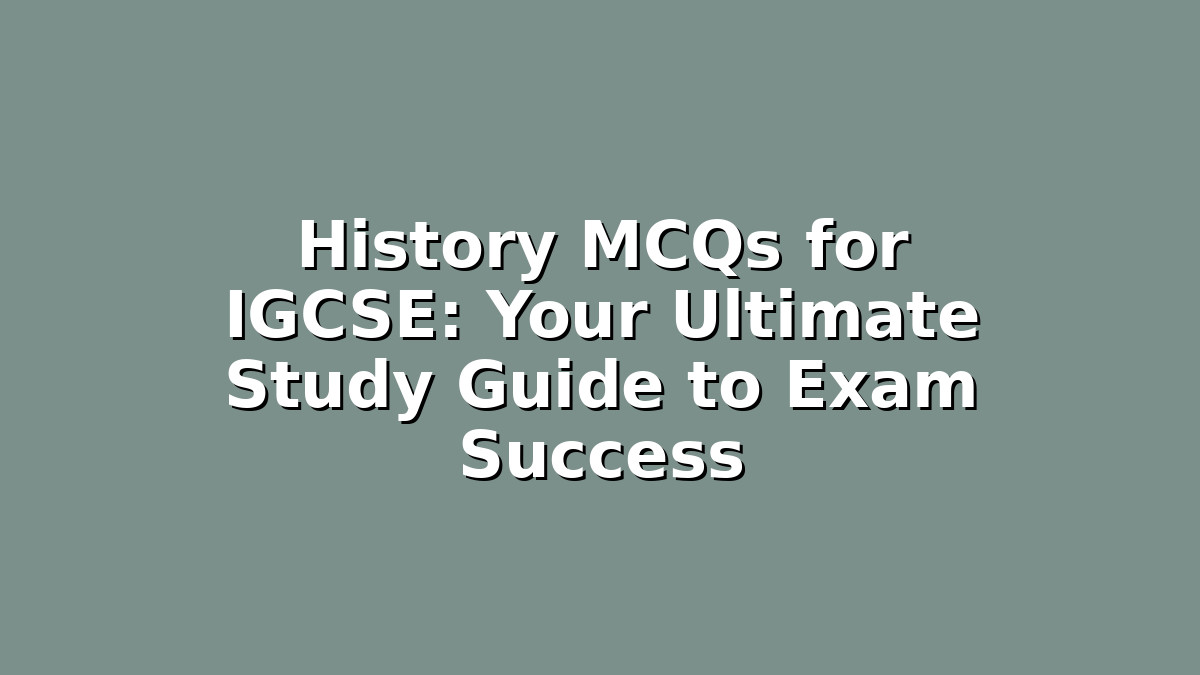Preparing for the IGCSE History exam can be both exciting and challenging. As a student, you want to ensure that you not only understand historical events but are also able to apply your knowledge effectively in the exam. One of the best ways to practice is by tackling multiple-choice questions (MCQs), which test your recall, comprehension, and analytical skills. In this article, we will explore how History MCQs can help you prepare better for the IGCSE, effective strategies to master them, and useful tips to boost your confidence and exam performance.
Why Practice History MCQs for IGCSE?
Multiple-choice questions are a common feature in many IGCSE History papers. They often cover a wide range of topics, from key events and dates to important figures and cause-effect relationships. Practicing History MCQs offers several benefits:
– Reinforces Knowledge: By answering a variety of questions, you repeatedly review important facts and concepts.
– Improves Speed and Accuracy: MCQs require quick recall and decision-making, helping you manage your time during exams.
– Identifies Strengths and Weaknesses: Consistently practicing MCQs helps you spot areas where your understanding is strong and areas needing improvement.
– Builds Exam Confidence: Familiarity with question formats reduces exam anxiety and boosts your confidence.
Now, let’s dive into how you can maximize your study sessions with History MCQs for IGCSE.
1. Organize Your Study Plan Around Key Themes and Topics
One of the first steps to mastering History MCQs is organizing your revision around the syllabus topics. The IGCSE History curriculum typically covers themes such as:
– International Relations (e.g., World Wars, Cold War)
– Political Changes (e.g., Revolutions, Empire building)
– Social and Economic Developments
– Conflict and Resolution
– Case Studies (e.g., Germany 1918-1939, Russia 1905-1941)
How to use MCQs effectively in your study plan:
– Break Down Topics: Divide your syllabus into manageable sections. For example, when studying the causes of World War I, try a set of MCQs focused solely on alliances, nationalism, and militarism.
– Timed Quizzes: Set a timer to simulate exam conditions. This helps build exam stamina and improves your ability to work under pressure.
– Track Your Progress: Keep a notebook or spreadsheet to record your scores and the types of questions you miss. Revisiting these will help target your weak points.
By aligning your MCQ practice with the syllabus topics, you create a structured approach that reinforces learning and prevents last-minute cramming.
2. Develop Critical Thinking Skills to Tackle MCQs
History MCQs might seem like simple recall questions, but many require deeper thinking and analysis. Often, questions will test your ability to interpret source material, understand cause and effect, and distinguish between similar historical events or viewpoints.
Tips to enhance critical thinking for History MCQs:
– Analyze Each Option: Don’t just look for the “obvious” answer. Read all answer choices carefully and eliminate those that are clearly wrong. This process of elimination increases your chances of selecting the correct answer.
– Use Context Clues: Sometimes, other questions or the wording within an MCQ provide hints. Always pay attention to dates, terminology, and key phrases.
– Practice Source-Based MCQs: Some IGCSE papers include questions based on historical sources such as letters, speeches, or propaganda posters. Practice interpreting these sources and answering related MCQs to sharpen your analytical skills.
– Understand Cause and Effect: History heavily involves understanding what events caused others and their consequences. When practicing MCQs, ask yourself “Why did this happen?” and “What was the impact?”
Building these analytical habits will not only improve your MCQ performance but also make writing longer answers easier.
3. Combine MCQ Practice with Other Study Methods for Holistic Preparation
While MCQs are excellent for quick revision and testing knowledge, combining them with other study methods ensures a well-rounded preparation.
Ways to integrate MCQs with other study techniques:
– Use Flashcards: Create flashcards for important dates, people, and events. Test yourself with MCQs and then reinforce your memory with quick flashcard reviews.
– Write Short Answers: After answering MCQs on a topic, try writing brief paragraphs explaining key events or causes. This deepens your understanding and prepares you for structured questions.
– Group Study Sessions: Join or form study groups where you can quiz each other with MCQs. Explaining why an answer is correct or incorrect helps solidify your knowledge.
– Watch Documentaries or Read Summaries: Sometimes visual or simplified content can help clarify complex topics. Follow up by testing yourself with MCQs on what you’ve learned.
Combining different methods keeps your study sessions engaging and more effective. It also ensures that you’re not just memorizing facts but comprehending the material deeply.
Conclusion
Preparing for IGCSE History doesn’t have to be overwhelming. Using MCQs as a core part of your revision strategy can make a big difference in how well you grasp the subject and perform on exam day. Remember to plan your studies around syllabus topics, develop strong analytical skills, and combine MCQs with other revision techniques for the best results. Stay consistent, practice regularly, and keep a positive mindset. With dedication and smart study habits, you’ll be well on your way to excelling in your IGCSE History exam.
Good luck!

Responses